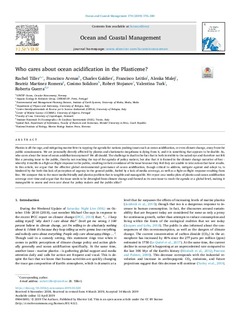| dc.contributor.author | Tiller, Rachel | |
| dc.contributor.author | Arenas, Francisco | |
| dc.contributor.author | Galdies, Charles | |
| dc.contributor.author | Leitão, Francisco | |
| dc.contributor.author | Malej, Alenka | |
| dc.contributor.author | Beatriz, Martinez Romera | |
| dc.contributor.author | Solidoro, Cosimo | |
| dc.contributor.author | Stojanov, Robert | |
| dc.contributor.author | Turk, Valentina | |
| dc.contributor.author | Guerra, Roberta | |
| dc.date.accessioned | 2019-05-24T13:13:14Z | |
| dc.date.available | 2019-05-24T13:13:14Z | |
| dc.date.created | 2019-05-22T13:45:41Z | |
| dc.date.issued | 2019-05-15 | |
| dc.identifier.citation | Ocean and Coastal Management. 2019, 174 170-180. | nb_NO |
| dc.identifier.issn | 0964-5691 | |
| dc.identifier.uri | http://hdl.handle.net/11250/2598694 | |
| dc.description.abstract | Plastics is all the rage, and mitigating marine litter is topping the agenda for nations pushing issues such as ocean acidification, or even climate change, away from the public consciousness. We are personally directly affected by plastics and charismatic megafauna is dying from it, and it is something that appears to be doable. So, who cares about the issue of ocean acidification anymore? We all should. The challenge is dual in the fact that is both invisible to the naked eye and therefore not felt like a pressing issue to the public, thereby not reaching the top of the agenda of policy makers; but also that it is framed in the climate change narrative of fear - whereby it instills in a fight-or-flight response in the public, resulting in their avoidance of the issue because they feel they are unable to take action that have results. In this article, we argue that the effective global environmental governance of ocean acidification, though critical to address, mitigate against and adapt to, is hindered by the both this lack of perception of urgency in the general public, fueled by a lack of media coverage, as well as a fight-or-flight response resulting from fear. We compare this to the more media friendly and plastics problem that is tangible and manageable. We report on a media plots of plastics and ocean acidification coverage over time and argue that the issue needs to be detangled from climate change and framed as its own issue to reach the agenda at a global level, making it manageable to assess and even care about for policy makers and the public alike? | nb_NO |
| dc.description.abstract | Who cares about ocean acidification in the Plasticene? | nb_NO |
| dc.description.sponsorship | Funded by the Horizon 2020 Framework Programme of the European Union. | nb_NO |
| dc.language.iso | eng | nb_NO |
| dc.publisher | Elsevier | nb_NO |
| dc.rights | Navngivelse 4.0 Internasjonal | * |
| dc.rights.uri | http://creativecommons.org/licenses/by/4.0/deed.no | * |
| dc.title | Who cares about ocean acidification in the Plasticene? | nb_NO |
| dc.type | Journal article | nb_NO |
| dc.type | Peer reviewed | nb_NO |
| dc.description.version | publishedVersion | nb_NO |
| dc.source.pagenumber | 170-180 | nb_NO |
| dc.source.volume | 174 | nb_NO |
| dc.source.journal | Ocean and Coastal Management | nb_NO |
| dc.identifier.doi | 10.1016/j.ocecoaman.2019.03.020 | |
| dc.identifier.cristin | 1699516 | |
| cristin.unitcode | 7566,2,0,0 | |
| cristin.unitname | Sjømatteknologi | |
| cristin.ispublished | true | |
| cristin.fulltext | original | |
| cristin.qualitycode | 1 | |

